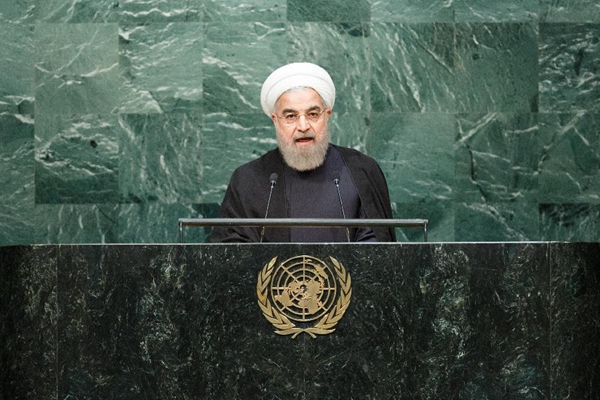Can Rouhani bring Iran into the international system?
- By Jin Liangxiang
 0 Comment(s)
0 Comment(s) Print
Print E-mail China.org.cn, September 14, 2017
E-mail China.org.cn, September 14, 2017
 |
|
President of Iran Hassan Rouhani [File photo] |
Iran’s integration into the international system since the revolution has witnessed a series of ups and downs. Hassan Rouhani’s re-election in 2017, however, means Iran is ready to restart the process as signified by the signing of the Joint Comprehensive Plan of Action (JCPOA).
There are many obstacles ahead, but China’s growing role internationally offers considerable hope.
The "international system" in this regard means the institutions and mechanisms, in which nation states interact with each other according to widely accepted rules. This has long been dominated by the West and featuring strong Western characteristics, focused on the political-security and economic aspects.
The United States, and the West at large, for most of the time since Iran’s revolution, has not accepted it as being part of its perception of the international system; indeed, it was seen as a major outsider challenging the political and security system.
Such epithets as "revolutionary fundamentalist state," being a part of the “axis of evil” and rogue state emerged at different times. As a result, the West adopted a policy to isolate and contain Iran diplomatically and politically, and has even talked of overthrowing its regime.
Economically, the United States has been imposing sanctions on Iran on both the unilateral and multilateral level. There are so many sanctions, in fact, that even Americans themselves have lost count.
Iran during Rafsanjani’s and Khatami's presidencies had launched intensive efforts for integration in the international system. Their efforts, though worthy, were only at the initial stage of improving bilateral relations with the actors sitting on the top of the system.
Rafsanjani regarded economic development and prosperity as one of the major sources of the legitimacy of the Islamic Republic. And economic development would have to depend on normal relations with the outside world, particularly the West.
Khatami was able to visit several Western countries, where he proposed the concept of dialogue among civilizations. Khatami’s government was at least able to achieve the Paris Agreement on its nuclear program with European countries in 2004.
But unfortunately, Iran’s integration was interrupted when Mohammed Ahmajinejad became president. During his presidency, from 2005 to 2013, Iran adopted a fresh hardline approach on the nuclear issue, which had been regarded by the West as another proof of Iran’s challenge to the international order.
As a result, the U.S., the West in general, and even the international community at large adopted more measures to isolate Iran politically and launched more economic sanctions.
Hassan Rouhani was a politician favored both by Rafsanjani and Khatami, and is regarded representing moderate and pragmatic group of Iranian politics. His election in 2013 suggested Iran wanted to have positive interactions with the international community.
Rouhani has been very resolute in reaching the nuclear deal via negotiation, and the deal well signifies Iran’s efforts for international acceptance. His reelection in 2017 in some way further consolidated Iran’s domestic political foundation for this approach to prosper.
However, Iran will have to face and overcome various tough challenges in the process. At home, it has to overcome the opposition from hardliners or conservatives, which will be a very tough challenge.
According to observers, Iran’s conservativism is strongly rooted in its special national psychology of a victim mentality based on centuries of humiliation. What’s more, Iran's conservatives have the protection of the Islamic system.
Internationally, Iran still faces some isolationist mentality. U.S. President Donald Trump, on many occasions, has expressed his intentions to tear up the nuclear deal, for example.
And the U.S. also has strong anti-Iran political forces at home for different reasons, for instance, Jewish lobbying and continued resentment over the 1979 hostage drama seen as an American humiliation.
However, China’s emergence as a major player in the international system will greatly promote Iran’s reintegration by diluting the Western influence.
China has initiated and participates as a major actor in a number of new and older institutions and mechanisms such as SCO (Shanghai Cooperation Organization), AIIB, the Belt and Road Initiative, BRICS and G20.
China has already played a constructive role in Iran’s relations with the international system dominated by the West. It mediated the nuclear deal, and will still be a major player safeguarding the implementation of the deal. This gives it much influence in bringing Iran back into the fold.
Dr. Jin Liangxiang is deputy director and Senior Research Fellow with the Center for West Asian and African Studies, Shanghai Institutes for International Studies. For more information please visit:
http://www.china.org.cn/opinion/jinliangxiang.htm
Opinion articles reflect the views of their authors, not necessarily those of China.org.cn.






Go to Forum >>0 Comment(s)